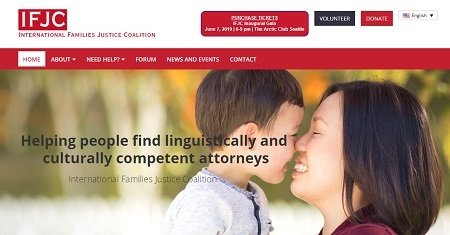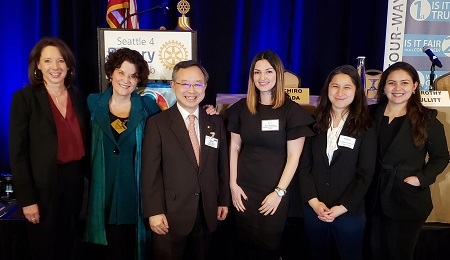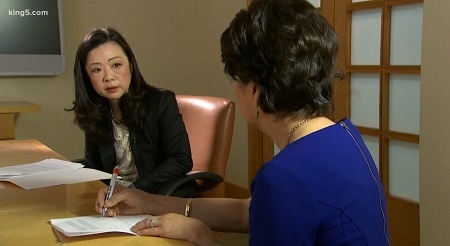Through the Eyes of the former Consul General Yamada (June, 2017 - July, 2020)
2019/5/23

Working on issues regarding unfair divorce –part II-
In the last column, I wrote about the reality faced by Japanese women married to an American, who experience domestic violence or unfair divorce proceedings.
Divorce issues, including those from international marriages, are a delicate matter as they involve individuals’ privacy, and victimized women often do not speak openly about their experiences. I was not aware of the significant social issues surrounding these unfair divorces until I heard from the lawyer, Ms. Inoue. Even after she explained the situation, I was not sure what could be done, but I still felt the need to do something.
In November 2017, five months after I started to work in Seattle, I visited Diane Narasaki, a Nikkei leader who served as Executive Director of Asian Counseling & Referral Services (ACRS) for a long time. ACRS is a nonprofit organization that provides various services for Asian residents who are socially vulnerable. When I spoke to her about this issue, she introduced me to Tony Lee, her long-time colleague and a well-known human rights activist. When I visited him in early December, he introduced me to the Hon. Jamie Pedersen, Washington State Senator, who then connected me to Mr. James Bamberger, Director of the Office of Civil Legal Aid of Washington State. We did not have a lot of time before the State legislative session began in January, but these connections provided a window of insight into the state legislature’s budget procedure and schedule. Therefore, in 2018, I took the first steps on this issue by suggesting a supplementary budget for working on immigrants’ divorce issues.
First, I created materials with Ms. Inoue and began presenting the issue to senators and representatives in relevant committees of the Washington state legislature. In the hallway of the state capitol, many lobbyists stood by the doors of the legislative chamber, waiting for their opportunity to pitch legislators as soon as they emerge. Even though the legislators’ schedules were hectic during the session, they kindly took time for us between the discussions. At that time, in both the Senate and House, Republicans and Democrats had the difference of just one vote and the two parties fiercely debated all issues. We wondered, would the immigrant divorce issue also become a source of conflict between the two parties?
Fortunately, this concern did not materialize. Some senators and representatives who listened to us grew visibly red with anger, saying that such an unfair matter should not be accepted in Washington State and promised to cooperate with us. The legislators we met provided advice on who we should meet next, allowing us to line up appointments one after another. By the end of the session we’d met over thirty state legislators, all of whom promised their support.
Thus, a supplementary budget item was approved to support the International Families Justice Coalition (IFJC), a nonprofit organization which provides legal support to disadvantaged victims and educates legal practitioners. This meant that the state legislature acknowledged this issue and recognized IFJC’s mission as deserving of public support. Washington State legislators not only listened to us, they also took initiative to include fiscal support in the budget. Witnessing their proactive attitude toward policy making, I couldn’t help but be impressed by how America’s democracy works. With continuing discussions taking place up until the time of writing (May, 2019), the total number of legislators we’ve spoken with has grown to almost fifty people.
In our talks, I have come to realize that there are two main roles the Consulate can play on this issue: social outreach and promoting prevention.
The issue of domestic violence towards foreign women is a prevalent one in society, happening, perhaps, in your neighborhood. But people who have relatively comfortable lives may not notice it. In reality, there have been a number of victims of domestic violence or abandonment, including Japanese women who came to the United States as war brides, and Filipino and Russian women who came as “mail-order brides” in the 90s. In recent years, this problem has been intensifying in Seattle where the population keeps growing. Awareness is key; as more people come to understand this issue, they may notice suspicious occurrences around them and find opportunities to help. Therefore, I contributed an editorial to the Seattle Times in April 2018.
Lighthouse Magazine also focused on the divorce problem in their September 2018 issue (Japanese).
In gatherings of Japanese and Japanese American community members, I have referred to this issue. I also spoke about it to the Seattle Consular Corps, which is comprised of representatives from more than 40 countries, including Honorary Consuls. While some Honorary Consuls already had experience helping such women, others did not know about this issue at all. At a gathering of representatives of Japan-America Societies from all over the United States last September, many of them told me that the same issues exist in their states.
I also thought the Seattle Rotary club, one of the largest rotary clubs in the world, woud benefit from learning about this issue. The club executives decided to take it up in their regular lunch meeting on March 6, two days before International Women’s Day. We invited nonprofit organizations which address related issues, such as Northwest Immigrant Rights Project, API Chaya, and IFJC, to present and participate in a panel discussion about the struggles that women from Latin America, Asia and Eastern Europe are facing.
Furthermore, Lori Matsukawa, a TV anchor at King 5 in Seattle, aired interviews with Ms. Inoue and me during her broadcast.
What can we do to prevent this issue? It’s important for both husbands and wives to recognize their legal rights and responsibilities. Unfair divorce agreements must be prevented from being made or accepted. Leaders of large organizations hiring lots of employees who might have international marriages, such as big corporations and Army and Navy bases, need to be alerted, I thought. When I spoke to military leaders about this issue they took it seriously, responding that “to maintain strong alliances between the U.S. and Japan and to keep American soldiers’ morale high, it is important that soldiers in international marriages have healthy family relations.” We are discussing with legal advisors of the troops to further cooperation with the U.S. military bases; organizing lectures and making educational brochures that teach legal rights and responsibilities for international newlyweds, are among the ideas under consideration.
Also, multiple state legislators gave me ideas, which include introducing measures and crafting laws to ensure foreign wives fully understand the contents of a divorce agreement before signing, legally requiring early mediation by a neutral lawyer before making a divorce agreement, and making it legal to withdraw from a divorce agreement in the case that a foreign partner signs it without understanding it. Furthermore, if a case enters the court, the judge’s understanding of the social background of this issue will often determine the result of the case. Given the lack of awareness on this issue within the court system, IFJC may implement a training program for judges.
Until today, issues related to the Hague Convention – such as cases where a Japanese mother takes her children back to Japan after a divorce – have had the spotlight in discussions between the Japanese and American governments. On the other hand, the tragedy caused by unfair divorce proceedings has not received much attention because they were treated as a private family issue. As the number of international marriages increases, the number of divorces will increase accordingly. The Consulate needs to consider what we can do in cooperation with the United States from a perspective of social needs, not just issuing marriage or divorce certificates.
A lot of things can happen in marriage even between two Japanese people. A marriage between a Japanese and an American may not necessarily end in a beautiful love story. I would like people to understand that it can be a risky bet. International marriages involve a significant decision, which could lead to living a life with a partner who has a different language, customs, values, and norms, in a foreign country far from your family and friends. Ask yourself calmly if you can depend on your partner for life, rather than marrying out of a temporary passion or calculation. Acquire knowledge about your rights and responsibilities in an international marriage, which may be different from a marriage with someone of the same nationality. Furthermore, once you get married, it is important to connect with communities you can go to in case you have a problem. I believe this is the most effective preventative measure for unfair divorce.





